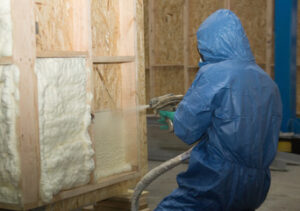Why You Should Insulate Your Attic
Insulating your attic prevents hot air from escaping your home in the summer and cold air in the winter. Attic Insulation Houston saves energy that would otherwise be used to fight temperature fluctuations and helps reduce utility bills.
 Fiberglass batt insulation is inexpensive and fairly easy to install. It can also keep out unwanted sounds and odors.
Fiberglass batt insulation is inexpensive and fairly easy to install. It can also keep out unwanted sounds and odors.
Energy Efficiency
Insulating your attic is one of the most cost-effective home improvement projects you can do. Having adequate insulation helps your home stay at a stable temperature and saves you money on energy bills each year. Proper insulation helps heat stay in your home during the winter and keeps it out in the summer, reducing your need for heating and cooling. In fact, a well-insulated attic can help reduce your energy bills by up to 20% each year.
There are many different types of insulation available, including fiberglass batts, cellulose and loose-fill fiberglass. Each type has a specific R-value, which is a measurement of how resistant it is to the transfer of heat. Fiberglass is the most common type of insulation, which comes in rolls or “batts.” It features tiny pieces of glass reinforced by plastic and is designed to fit between attic joists. It also is available in a variety of thicknesses, so you can choose the level of protection that best suits your home.
Loose-fill insulation is another option, which can be blown into attics and finished wall cavities. It is made from a fibrous material, such as cellulose or glass wool, which is blown into a space through a suitably sized hole and fills the area. It is a great option for existing homes that are not already insulated, and it can be sprayed into hard-to-reach areas of your home.
Cellulose is another choice and is typically used in new construction or older homes with wood frame construction. It is densely packed independent fragments of boric-acid-treated recycled ground paper and has an average R-value of 3.5 per inch. This type of insulation can be sprayed into your attic, but it is typically applied with a blower to ensure it reaches every nook and cranny.
Some homeowners may choose to install a vapor barrier in their attic along with the insulation. This barrier prevents moisture from seeping into your home through the attic, which can lead to mold and mildew. This is particularly important if you have an attic space that is used for storage or other purposes.
Reduced Energy Bills
If you’re a homeowner with high energy bills, it’s worth your while to consider attic insulation. Heat loss through the attic accounts for about 20 percent of your home’s heating and cooling costs, but that can be greatly reduced by proper insulation. In fact, insulating your attic alone can save you up to 50 percent on your heating and cooling costs.
You may already know that your home needs to be properly insulated, but it’s often difficult to determine the best type of insulation and R-value for your home. Many insulation materials are categorized by an R-value, and this rating determines how well the material resists thermal transfer. The higher the R-value, the more energy your home will save.
The types of insulation available to homeowners include blanket insulation, fiberglass batts, cellulose and loose-fill fiber insulation, also known as blown-in insulation. The best choice for your home depends on a number of factors, including the location of your house and the type of heating system you have.
Insulating your attic reduces energy bills by limiting air leakage into the living space of your home. In winter, escaping air will drive up your heating bill; in summer, it will drive up your cooling bill. Insulating your attic stops this flow and keeps your home at a comfortable temperature all year round.
While you can DIY blanket and cellulose insulation, if you opt for spray foam or structural insulated panels it’s important to hire professional contractors. This will ensure the insulation is correctly fitted and applied for maximum energy savings.
In addition to saving money on your energy bills, proper attic insulation will prevent the growth of mold and mildew in the ceilings of your home. This will prevent the spread of these harmful microorganisms throughout your home and improve indoor air quality (IAQ).
Poor IAQ can have serious health consequences, including respiratory problems, heart disease and cancer. Increasing the amount of insulation in your attic and other areas that are notorious for letting in cold air, such as basements and crawl spaces, will greatly improve your IAQ and make your home healthier to live in.
Increased Home Value
When homeowners think of home improvement projects that will increase the resale value of their homes, they typically focus on things like painting the exterior or improving the kitchen design. While these are great upgrades to make that will boost your home’s resale value, adding attic insulation should also be on the list. In fact, a properly insulated attic can add between 2 and 6 percent to your home’s overall property value.
Attic insulation isn’t something that you can see from the outside of your house so it’s easy to overlook. However, it is a valuable upgrade to your home that you can reap the benefits of for years to come.
Added attic insulation will decrease your energy usage which in turn will reduce your home’s utility bills. The amount of money you will save each month will vary based on the type and size of your home, as well as the climate in which you live. However, you can expect to save hundreds or even thousands of dollars each year.
In addition to the financial benefits, attic insulation will increase your home comfort. Bedrooms located on upper floors are particularly susceptible to the outside temperature and often experience hot or cold spots. Adding attic insulation will help to keep these rooms comfortable and improve your home’s indoor air quality (IAQ).
Proper attic insulation is also important for reducing outside noise from entering your home. When you live in an area with high winds and thunderstorms, those loud crashes of thunder can be quite disturbing. Attic insulation is rated with SPF (sound protection factor) which helps to significantly reduce sound transmission between different areas of your home.
When it’s time to sell your home, having attic insulation will be a major selling point. It will show potential buyers that your home is energy efficient and a place they can comfortably call their own. Energy-efficient homes are highly desirable and are a top priority for many homebuyers. As a result, it’s likely that you will recoup your investment in attic insulation if you decide to sell your home in the future.
Reduced Risk of Fire
There are about 10,000 residential fires that begin in the attic every year. While new building codes and flame-retardant insulation have made attic fires less common, they still occur often enough to cause significant damage to homes. Many of these attic fires are caused by overheated wires due to faulty wiring installation or defective components. Pests like mice frequently chew through wires, exposing them to the heat of your attic and causing them to ignite. In some cases, attic insulation itself can burn if it comes into contact with an overheated wire.
Insulating your attic can help prevent fires from occurring because it helps to keep hot air contained. When your home is properly insulated, the warm air stays where it belongs, in your rooms. Insulation can also prevent cold air from infiltrating your home, which reduces the amount of energy you need to use for heating and cooling.
A home with insufficient insulation can allow cold air to enter through the attic and other places, such as around doors and windows. This can affect the temperature in each room and make it difficult for your heating and cooling system to operate effectively. Properly insulating your home can prevent this problem by keeping cold air where it belongs.
Cellulose insulation is a popular choice for attic insulation because it is very effective and inexpensive. However, it can be a fire hazard because of the organic materials it contains. This type of insulation can smolder when it is dry and must be treated with fire retardant chemicals to reduce its risk. Fiberglass insulation is another option for attic insulation. It is more flammable than cellulose, but it can be treated with flame retardants to increase its fire safety rating.
If you opt to use blown in cellulose insulation in your attic, it is essential that the insulation is placed far enough away from any recessed light fixtures. If not, the insulation can block the light fixture and possibly cause a fire. In addition, when using sprayed foam insulation, it is important that the contractor create a cylinder of flashing that is at least four inches larger than the diameter of each recessed light fixture. This will help to protect the light fixture from a fire, as well as the ceiling.
